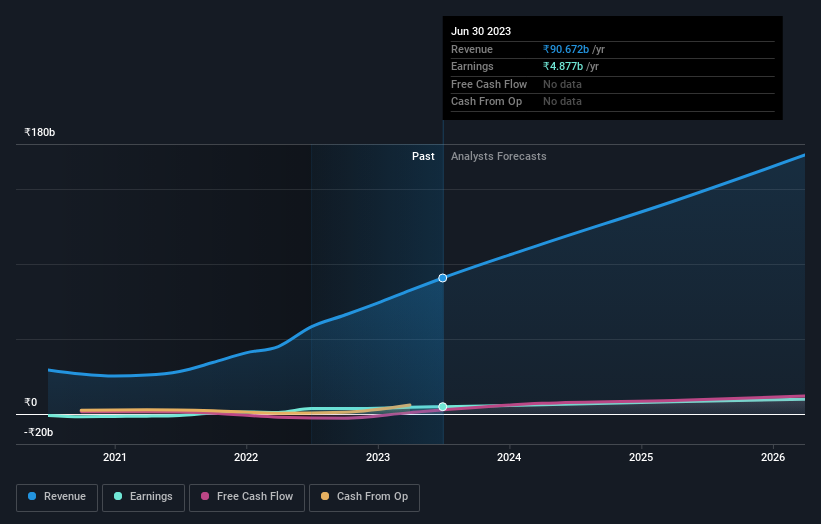Stock Analysis
- India
- /
- Specialty Stores
- /
- NSEI:TRENT
Trent's (NSE:TRENT) five-year earnings growth trails the incredible shareholder returns

Buying shares in the best businesses can build meaningful wealth for you and your family. And highest quality companies can see their share prices grow by huge amounts. To wit, the Trent Limited (NSE:TRENT) share price has soared 565% over five years. If that doesn't get you thinking about long term investing, we don't know what will. It's also good to see the share price up 30% over the last quarter. Anyone who held for that rewarding ride would probably be keen to talk about it.
The past week has proven to be lucrative for Trent investors, so let's see if fundamentals drove the company's five-year performance.
View our latest analysis for Trent
While Trent made a small profit, in the last year, we think that the market is probably more focussed on the top line growth at the moment. Generally speaking, we'd consider a stock like this alongside loss-making companies, simply because the quantum of the profit is so low. It would be hard to believe in a more profitable future without growing revenues.
The graphic below depicts how earnings and revenue have changed over time (unveil the exact values by clicking on the image).

Trent is a well known stock, with plenty of analyst coverage, suggesting some visibility into future growth. You can see what analysts are predicting for Trent in this interactive graph of future profit estimates.
What About Dividends?
It is important to consider the total shareholder return, as well as the share price return, for any given stock. The TSR is a return calculation that accounts for the value of cash dividends (assuming that any dividend received was reinvested) and the calculated value of any discounted capital raisings and spin-offs. It's fair to say that the TSR gives a more complete picture for stocks that pay a dividend. We note that for Trent the TSR over the last 5 years was 571%, which is better than the share price return mentioned above. The dividends paid by the company have thusly boosted the total shareholder return.
A Different Perspective
We're pleased to report that Trent shareholders have received a total shareholder return of 44% over one year. That's including the dividend. However, that falls short of the 46% TSR per annum it has made for shareholders, each year, over five years. I find it very interesting to look at share price over the long term as a proxy for business performance. But to truly gain insight, we need to consider other information, too. Consider for instance, the ever-present spectre of investment risk. We've identified 2 warning signs with Trent (at least 1 which shouldn't be ignored) , and understanding them should be part of your investment process.
We will like Trent better if we see some big insider buys. While we wait, check out this free list of growing companies with considerable, recent, insider buying.
Please note, the market returns quoted in this article reflect the market weighted average returns of stocks that currently trade on Indian exchanges.
Valuation is complex, but we're helping make it simple.
Find out whether Trent is potentially over or undervalued by checking out our comprehensive analysis, which includes fair value estimates, risks and warnings, dividends, insider transactions and financial health.
View the Free AnalysisHave feedback on this article? Concerned about the content? Get in touch with us directly. Alternatively, email editorial-team (at) simplywallst.com.
This article by Simply Wall St is general in nature. We provide commentary based on historical data and analyst forecasts only using an unbiased methodology and our articles are not intended to be financial advice. It does not constitute a recommendation to buy or sell any stock, and does not take account of your objectives, or your financial situation. We aim to bring you long-term focused analysis driven by fundamental data. Note that our analysis may not factor in the latest price-sensitive company announcements or qualitative material. Simply Wall St has no position in any stocks mentioned.
About NSEI:TRENT
Trent
Trent Limited operates a chain of retail stores primarily under the Westside brand in India.
Exceptional growth potential with proven track record.

